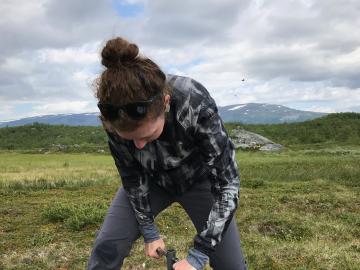
Filter News
Area of Research
- (-) Energy Science (75)
- (-) National Security (19)
- Advanced Manufacturing (3)
- Biology and Environment (90)
- Biology and Soft Matter (1)
- Computational Biology (1)
- Computer Science (1)
- Fusion and Fission (6)
- Isotope Development and Production (1)
- Isotopes (4)
- Materials (39)
- Materials for Computing (7)
- Neutron Science (17)
- Nuclear Science and Technology (4)
- Quantum information Science (1)
- Supercomputing (59)
News Type
News Topics
- (-) Artificial Intelligence (17)
- (-) Clean Water (4)
- (-) Environment (35)
- (-) Polymers (6)
- (-) Space Exploration (1)
- 3-D Printing/Advanced Manufacturing (53)
- Advanced Reactors (6)
- Big Data (5)
- Bioenergy (26)
- Biology (12)
- Biomedical (7)
- Biotechnology (4)
- Buildings (19)
- Chemical Sciences (13)
- Composites (7)
- Computer Science (32)
- Coronavirus (10)
- Critical Materials (4)
- Cybersecurity (23)
- Energy Storage (46)
- Exascale Computing (2)
- Fossil Energy (2)
- Frontier (1)
- Fusion (2)
- Grid (25)
- High-Performance Computing (9)
- Hydropower (1)
- Isotopes (1)
- Machine Learning (15)
- Materials (23)
- Materials Science (18)
- Mathematics (1)
- Mercury (2)
- Microelectronics (1)
- Microscopy (6)
- Molten Salt (1)
- Nanotechnology (8)
- National Security (36)
- Neutron Science (13)
- Nuclear Energy (9)
- Partnerships (16)
- Physics (2)
- Quantum Science (3)
- Security (14)
- Simulation (2)
- Summit (6)
- Transportation (35)
Media Contacts
A team of scientists led by Oak Ridge National Laboratory found that while all regions of the country can expect an earlier start to the growing season as temperatures rise, the trend is likely to become more variable year-over-year in hotter regions.

Energy storage startup SPARKZ Inc. has exclusively licensed five battery technologies from the Department of Energy’s Oak Ridge National Laboratory designed to eliminate cobalt metal in lithium-ion batteries. The advancement is aimed at accelerating the production of electric vehicles and energy storage solutions for the power grid.

A typhoon strikes an island in the Pacific Ocean, downing power lines and cell towers. An earthquake hits a remote mountainous region, destroying structures and leaving no communication infrastructure behind.

While Tsouris’ water research is diverse in scope, its fundamentals are based on basic science principles that remain largely unchanged, particularly in a mature field like chemical engineering.

A technology developed at the ORNL and scaled up by Vertimass LLC to convert ethanol into fuels suitable for aviation, shipping and other heavy-duty applications can be price-competitive with conventional fuels

An international team of scientists, led by the University of Manchester, has developed a metal-organic framework, or MOF, material

Students often participate in internships and receive formal training in their chosen career fields during college, but some pursue professional development opportunities even earlier.

Elizabeth Herndon believes in going the distance whether she is preparing to compete in the 2020 Olympic marathon trials or examining how metals move through the environment as a geochemist at the Department of Energy’s Oak Ridge National Laboratory.

Researchers at the Department of Energy’s Oak Ridge National Laboratory have received five 2019 R&D 100 Awards, increasing the lab’s total to 221 since the award’s inception in 1963.

In the vast frozen whiteness of the central Arctic, the Polarstern, a German research vessel, has settled into the ice for a yearlong float.


